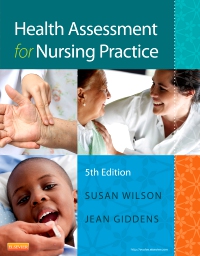
Health Assessment for Nursing Practice - Elsevier eBook on VitalSource, 5th Edition
Elsevier eBook on VitalSource

In today’s nursing programs, both instructors and students are busier and more pressed for time than ever. The 5th edition of Health Assessment for Nursing Practice by Susan Wilson and Jean Giddens is designed to help you make the most of your time with a user-friendly approach and a complete collection of flexible, efficient tools for teaching and learning. It's everything you need to help your students master the core assessment skills essential for clinical practice!
Newer Edition Available
Health Assessment for Nursing Practice - Elsevier eBook on VitalSource
-
- Straightforward, easy-to-understand coverage clearly differentiates between basic and advanced health assessment skills.
- NEW and UNIQUE! Quality and Safety Competencies for Nurses (QSEN) tables address assessment competencies related to patient-centered care, teamwork and collaboration, evidence-based practice, quality improvement, safety, and informatics.
- Comprehensive educator support saves you time and helps you create an engaging course that encompasses the core knowledge students need for safe practice.
- Vivid color photos and a, two-column format provides students with a visual distinction between normal and abnormal findings and techniques.
- NEW! Adapting Health Assessment to an Ill Patient chapter explains special techniques for performing a head-to-toe assessment of a patient in a hospital setting, illustrated with a series of new examination photos.
- Health Promotion for Evidence-Based Practice boxes outline new Healthy People 2020 objectives and include thorough discussions of recommendations for health promotion and reducing risk.
- UNIQUE! Case Studies with Clinical Reasoning Questions strengthen your students’ critical thinking skills with algorithms focusing on noticing, interpreting, and responding.
- UNIQUE! Clinical Reasoning: Thinking Like a Nurse boxes explain the thought process of an experienced nurse making a clinical decision to help students gain perspective on clinical judgment and the decision-making process.
- UNIQUE! Concept Overview sections present core concepts in the context of health assessment with discussions on pain, oxygenation, perfusion, tissue integrity, motion, sensory perception, metabolism, and intracranial regulation.
- NCLEX examination-style review questions at the end of each chapter help students assess their understanding of the content they need to know to pass the exam.
- Ethnic, Cultural, and Spiritual Variations boxes help students anticipate the unique needs of a multicultural patient population.
- UNIQUE! Patients with Situational Variations sections address special circumstances or needs for patients in wheelchairs or other limitations and exam variations.
-
- NEW! Adapting Health Assessment to an Ill Patient chapter explains special techniques for performing a head-to-toe assessment of a patient in a hospital setting, illustrated with a series of new examination photos.
- UNIQUE! Case Studies with Clinical Reasoning Questions strengthen your critical thinking skills with algorithms focusing on noticing, interpreting, and responding.
- NEW and UNIQUE! Quality and Safety Competencies for Nurses (QSEN) tables address assessment competencies related to patient-centered care, teamwork and collaboration, evidence-based practice, quality improvement, safety, and informatics.
- Health Promotion for Evidence-Based Practice boxes outline new Healthy People 2020 objectives and include thorough discussions of recommendations for health promotion and reducing risk.
- Ethnic, Cultural, and Spiritual Variations boxes help you anticipate the unique needs of a multicultural patient population.
- Newly combined Health Assessment Across the Life Span unit contains four separate chapters that cover all lifespan content, including older adults, pregnant patients, and infants, children, and adolescents.
- NEW! Synthesis and Application of Health Assessment unit details how to conduct, document, and adapt the head-to-toe assessment.
-
I. Foundations for Health Assessment
1. Importance of Health Assessment
2. Interviewing Patients to Obtain a Health History
3. Techniques and Equipment for Physical Assessment
4. General Inspection and Measurement of Vital Signs
5. Ethnic, Cultural, and Spiritual Considerations
6. Pain Assessment
7. Mental Health and Abusive Behavior Assessment
8. Nutritional Assessment
II. Health Assessment of the Adult
9. Skin, Hair, and Nails
10. Head, Eyes, Ears, Nose, and Throat
11. Lungs and Respiratory System
12. Heart and Peripheral Vascular System
13. Abdomen and Gastrointestinal System
14. Musculoskeletal System
15. Neurologic System
16. Breasts and Axillae
17. Reproductive System and the Perineum
III. Health Assessment Across the Life Span
18. Developmental Assessment Throughout the Life Span
19. Assessment of the Infant, Child, and Adolescent
20. Assessment of the Pregnant Patient
21. Assessment of the Older Adult
IV. Synthesis and Application of Health Assessment
22. Conducting a Head-to-Toe Examination
23. Documenting the Head-to-Toe Health Assessment
24. Adapting Health Assessment to an Ill Patient
Appendixes
A. Health History Using Functional Health Patterns
B. Conversion Tables
C. Abbreviations
D. Answer Key
